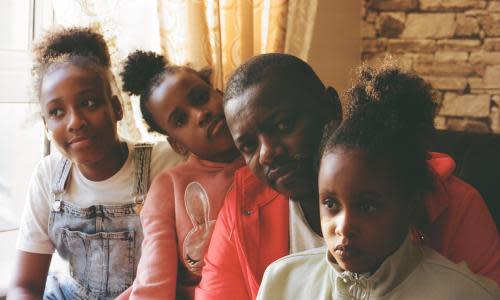Surviving Covid review: tales of dedication – and desperation

We first meet 61-year-old Joaquín – hotel worker, widower, stepfather – on his 110th day in intensive care with Covid-19. He has had what his doctor calls “significant complications”. His lungs, heart, blood vessels and kidneys have been affected. He is unconscious and on a ventilator. “There is a much greater chance of him dying than surviving,” says Dr Tom Best, the clinical director of critical care at King’s College hospital. When the virus first appeared, they thought patients would need a few days on a ventilator and then recover. It has not turned out that way.
Joaquín is one of four patients in the intensive care unit at King’s whose trajectories are traced in Channel 4’s documentary Surviving Covid. There is also 62-year-old David, a builder, who has been with his wife Gill for 48 years. They thought the coronavirus was “just a story” when they first heard about it. But David caught it at the end of January, when his immune system was weakened by cancer treatment. His subsequent hospitalisation is the longest they have ever been apart. Gill is convinced he is going to make it. Her daughter Kelly thinks it will help when they are able to visit in person. “It’s not a measurable science, is it, unconditional love? But there is a value to it,” says Kelly.
Sama is a 52-year-old healthcare worker who has been in hospital “for two months and some weeks”, according to one of his three young daughters. “I hope you can hear us,” his wife Amina says to him through her tears, during a video call to her comatose husband. “Please come back,” she says, repeatedly. “Please come back, please come back, please come back.” You have to reach back into the recesses of memory for the word. She is keening.
Tobi is a 52-year-old pastor who has been married to Ola for 26 years. They met at church, and she knew God had sent him to be her husband. By the time we meet him – shifting restlessly under the wires that cover him in his hospital bed – he has had multiple strokes and heart attacks, his kidneys have failed and he is ventilated. “Our every conversation with the family is threaded through with realism about the fact that he is still in a very vulnerable state,” says his doctor, Rob Elias.
The art behind telling a family what it has to hear in a way that it can bear, the empathy needed to provide the facts, while leaving enough room for self-protection mechanisms to manoeuvre, turns so much on a doctor’s ability and willingness to communicate in a meaningful way that it is almost frightening. The ones we see on our screens, of course, are generally those best fitted for it, and it is somehow most often that this extra layer of grace under pressure that finally undoes me.
Not, of course, that any documentary of this nature is short of material to do that. Our four patients represent the gamut of outcomes. David deteriorates. “There are lots of little hurdles we’re not quite clearing,” begins Dr Hurst. “I know what they’re trying to say,” says Gill afterwards. “They have to prepare you. But I’m not ready to be prepared yet.” But eventually they reach “the end of what ICU can offer him … So the difference becomes between a good death – that the family can have some time to prepare for – versus an uncomfortable death that might happen in the middle of the night without them,” says Dr Hurst. And so Gill prepares, and David is vouchsafed a good death.
Sama recovers remarkably, and is able to leave hospital. He faces a long rehabilitation, but you can see he is essentially sound once more in wind and limb. Tobi goes home, too, but Covid has left him irrevocably changed. “He will not fully recover the brain function he had before,” says Dr Elias. Tobi’s son Deji says his father still has “his spirit, his soul”.
Joaquín recovers from multi-organ failure to a degree that has you reaching for the language of miracles, and if it didn’t do a disservice to the knowledge and expertise that went into saving him, I would. You watch the doctors and the nurses and the healthcare assistants at work and realise the porosity of distinctions anyway – unconditional love takes many forms, and its value is eternal.

 Yahoo Movies
Yahoo Movies 